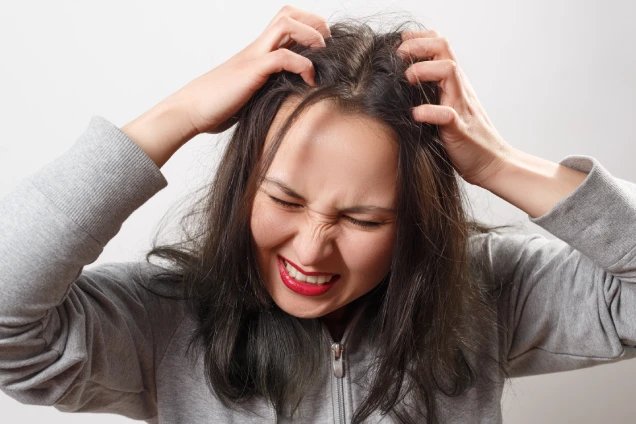
Human scalp is a sophisticated neuro endocrine part of the skin. It has a rich nerve supply, and it is also affected by hormonal changes in the body. An itchy scalp can result from various dermatological conditions as well as neurological conditions.
1. Dandruff (Seborrheic Dermatitis: Overgrowth of yeast (Malassezia) or sensitivity to it leads to flaky and itchy scalp. This condition is called seborrheic dermatitis. It presents as white flakes, redness, and itching. The flakes may fall on the shoulders. Medicated shampoos with ingredients like zinc pyrithione, ketoconazole, or salicylic acid are the mainstays of treatment. However severe seborrheic dermatitis may warrant systemic antifungal treatment.
2. Psoriasis: An autoimmune condition leading to rapid skin cell buildup, leading to redness and flaking off . Patients present with thick, scaly patches (plaques) that may extend beyond the scalp. scalp psoriasis is treated using topical corticosteroids, medicated shampoos containing coal tar and phototherapy. However, systemic medication may be necessary in severe cases including methotrexate, cyclosporine and biologicals.
3. Eczema (Atopic Dermatitis): it is a hypersensitive immune response, often associated with allergies or asthma. It generally presents with red , inflamed, itchy skin, sometimes oozing or crusting. The itch may be so severe that it disturbs the patient's sleep . Moisturizers, anti-inflammatory creams, and antihistamines are the main line of treatment. However, severe cases may warrant systemic treatment.
4. Tinea Capitis (Scalp Ringworm): A fungal infection of the scalp: Round, scaly patches, hair loss, and intense itching. It is more common in children. Oral antifungal medications are almost always needed to treat this condition as topicals are usually ineffective.
5. Contact Dermatitis: Allergic or irritant reaction to hair products, dyes, or treatments. Redness, itching are usual complaints, sometimes in severe cases, blisters or flaking. Management includes avoiding the triggers, antihistamines, and corticosteroid creams. Severe cases do require systemic medications.
6. Head Lice (Pediculosis Capitis): Infestation of lice is a common problem in lower socioeconomic status communities where overcrowding and lack of hygiene is a problem. Intense itching due to an allergic reaction to lice bites. The leaf fruits around the neck may be enlarged. Nits and live insects may be visible. Over-the-counter or prescription lice treatments and thorough combing. The treatment may be required to repeat several times to clear the lice completely. Oral medications are also available. Improvement of living conditions and hygiene helps in long-term clearance. Treatment of all the affected individuals is necessary to clear the infection.
7. Dry Scalp:Cause: Lack of moisture in the scalp, often due to weather, dehydration, or harsh shampoos. It presents with flaky skin (different from dandruff), tightness, and itching. Commonly seen in old age. Hydrating shampoos, oils, and humidifiers.
8. Folliculitis: Infection or inflammation of hair follicles, often bacterial or fungal. Symptoms: Red, pimple-like bumps, pain, and itching. Antibacterial or antifungal medications, warm compresses.
9. Allergic Reactions: Sensitivity to ingredients in hair products. Immediate or delayed redness, swelling, and itching. Identify and avoid allergens, and use soothing or hypoallergenic products.
10. Lichen Planopilaris: A rare inflammatory condition affecting hair follicles, causing significant hair loss, which can be permanent . Patients usually present with scalp tenderness, itching, and patchy hair loss. A detailed exam examination, including tri and skin biopsy is essential for diagnosis. The line of management includes topical corticosteroids, immunosuppressants, or other anti-inflammatory treatments.
11. Neuropathic itching: It occurs when the nerves are damaged. Usually itching is accompanied by numbness and tingling. It is usually seen after nerve damage in conditions like herpes zoster, trauma and notalgia paresthetica.
12. Neurogenic pruritus: This condition is mediated by opioid and serotonin receptors, where the central inhibitory circuits are affected. This kind of pros is seen with patients with cholestasis (liver disease)and chronic kidney disease.
13. Psychogenic pruritus: it is associated with psychiatric disorders including depression and delusion of parasitosis. The itch perception is mediated by psychological factors.
Our dermatologists at Subodha Clinic and cosmetic clinic, take a detailed history, do an examination of the scalp, do trichoscopy and if necessary, take samples for examination, and then come for a proper diagnosis. Once the diagnosis is established treatment of the underlying condition will be done accordingly.